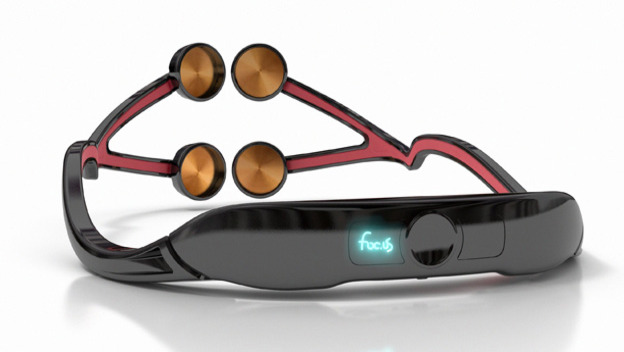Anytime someone wants to fire electricity into your brain for entertainment purposes, you should probably be a little suspicious. And a company called Focus Labs has created just such a device .
The headset, which the developer calls foc.us, claims to “make your synapses fire faster” using “transcranial Direct Current Stimulation (tDCS) to increase the plasticity of your brain.”
Focus Labs has also created an iPhone application that allows people to manually control the headset through a Bluetooth connection. Sorry Android users, you won’t be able to electrocute your brains with such convenience.
I probably shouldn’t have to say this, but most neurologists discourage the playful use of tDCS. And it is becoming disturbingly popular among non-medical professionals. Last April, Nicholas Fitz and Peter Reiner published an article in the Journal of Medial Ethics that laid the problem out thusly: “Barely a week goes by without a new online posting either offering to sell users inexpensive tDCS devices or providing instructions for building one themselves; essentially, one needs only a 9 V battery, about $50 worth of easy-to-source electronic parts and basic instructions.”
Because these devices require so little voltage to impact cognitive function, they’re crawling out of the woodwork all across the planet. And, like most snake oil salesmen, the “laboratories” behind these products aren’t shy about their “medical benefits.”
However, scientists don’t actually know enough about tDCS to make any foundational claims about its benefits. It’s been used to treat things like stroke, pain, and depression, but its use as an all-purpose cognitive enhancer, especially by lay people, is starting to worry neurologists.
Dr. Alan Pearce, a senior lecturer at The University of Melbourne, specifically targeted the foc.us in a recent blog post entitled “This is NOT what brain stimulation should be used for.” Dr. Pearce points out that Focus Labs doesn’t have their facts straight:
tDCS changes the membrane potential of the neurons targeted by tDCS (where the electrodes are placed) make them more likely, or less likely, to fire. Unlike other techniques (such as TMS or ECT) which actually do make the [neurons] fire (depending on the intensity provided) tDCS is a more subtle technique. Studies in our laboratories have found increased excitability (when used properly over the motor areas of the brain) but this does not translate into synapses firing faster.
Obviously, the claim that foc.us can encourage your synapses to fire more quickly is dubious at best. Plus, Pearce points out that it can have some pretty severe side effects:
What is also of concern here is the placement of the electrodes being over both the left and right frontal lobes, as one area becomes more excited, the other area become more inhibited. This may contribute to decision making or changes in mood, particularly if used excessively.
So, instead of turning your brain into a more effective video game machine, it may actually turn you into an unstable jerk. Bravo, Focus Labs. This is why I don’t allow uneducated hillbillies to fool around with my brain.

My favorite part of the whole website, though, is the FAQ. It’s as if they’re completely confused by the concept of an FAQ:
Is foc.us FDA approved?
No. The foc.us gamer headset offers no medical benefits, is not a medical device, and is not regulated by the FDA.
Wait, doesn’t the foc.us promise to “make your synapses fire faster?” This isn’t a medial benefit? It continues:
Is the headset safe?
The foc.us headset has been tested to all required regulatory standards including CE Safety standard EN60601-2-10: 2001 and EN60601-1: 2006.
Yeah, but is the headset safe? Is Focus Labs actually avoiding a question in their own FAQ?
Please. Don’t buy this product, even as a joke. Stupidity doesn’t need any more financial support.
